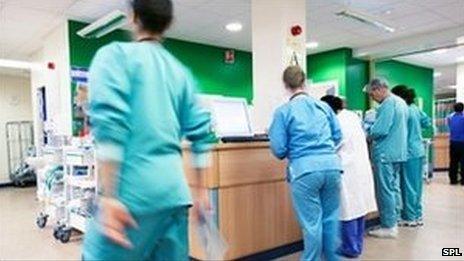Private firms 'win 70% of NHS contracts'
- Published

More than 70% of NHS contracts awarded since April 2013 have gone to private sector bidders
Almost 70% of contracts for NHS services in England between April-December 2013 were won by private firms, a campaign group claims.
NHS reforms mean "qualified providers" can bid to provide clinical services, such as scans and out-of-hours care.
The NHS Support Federation, which opposes a competitive market in the NHS, said that, of 57 contracts awarded, 39 went to private firms.
The government said the figures were "selective and misleading".
The NHS Support Federation said 15 of the 57 contracts went to the NHS, two went to charities and one was shared between the NHS and a non-NHS supplier.
They cover everything from mental health services, GP and out-of-hours services and diagnostics such as blood tests, X-rays and scans.
The campaign group says that contracts worth a total of £5bn were advertised between April-December 2013. Of those, contracts worth £510m were actually awarded in that time with £450m worth awarded to non-NHS suppliers.
'Genuinely surprised'
The figures come from an analysis of competitive tender notices on the European public procurement, external website, compiled by the federation.
Director Paul Evans says the big question is whether private companies will provide a better service for patients.
"I think people are going to be genuinely surprised by what's happening," he said.
"The scope of this change means that it is affecting all kinds of care that you might experience as a patient, everything from your first visit to the GP, diagnostic tests, treatment in hospital and care further on from that.
"We're talking about the whole gamut of care and a massive change in the way we use services in the future."
But the Department of Health (DoH) said the NHS Support Federation's figures "only relate to a small sample of NHS contracts and are therefore selective and misleading".
"The reality is that private sector providers only carry out around 6% of all NHS work," a spokesperson said.
The NHS Support Federation's figures related only to contracts for clinical services awarded between April and December 2013 while the DoH figures covered the period from 2010 to now and were for both clinical services and other supplier contracts, such as management and catering services.
The contracts involved relatively small sums of money in the grand scheme of the overall NHS budget of £100bn each year but there are some very big contracts coming down the pipeline.
More collaboration
Much of what is called primary care - GPs, dentists and pharmacists for example - is already run by private businesses on behalf of the health service.
A minority of hospital services - about 5% - were already delivered by the private sector before the coalition government's reforms but the NHS Support Federation says it is now taking a bigger stake.
In 2012 a private company, Circle, took over the running of the failing Hinchingbrooke Hospital in Cambridgeshire, the first time an NHS Trust was handed over to the private sector.
The hospital's chief executive, Hisham Abdel-Rahman, says more private sector involvement is vital for the future of the NHS.
"I would hope to see more collaboration between industry, including the private sector and universities, to bring innovations in medicine into everyday practice in hospitals.
"This is the only way we can overcome the financial and workload challenges in the NHS.
"However, it will depend on the the bravery - as well as the appetite - of the politicians to go that far."
But campaigners like Dr Jacky Davis, of Keep our NHS Public, say competitive tendering is undermining the National Health Service.
"The problem is the government are wasting tens of millions of pounds on these contracts, money that should be spent on front-line patient care.
"These companies have a record of just walking away when things go wrong and dumping the problems back on the NHS as we saw with the PIP breast implants scandal.
"This isn't privatisation by the back door, it's privatisation by the front door, and it is really putting patients' lives at risk."
Clinical need
NHS care is already moving from the hospital to the High Street.
The Scrivens chain of opticians is among those offering a service for testing and fitting hearing aids.
Director Mark Georgevic says private sector involvement will be good for patients.
"I'm sure if there are other services that could be easily provided on the High Street they will benefit.
"Patients like it. They don't want necessarily to have to go to a hospital environment.
"Being in the community is very important. We're still an NHS provider, based on clinical need and not necessarily the ability to pay."
- Published25 April 2013
- Published3 March 2013
- Published1 March 2013